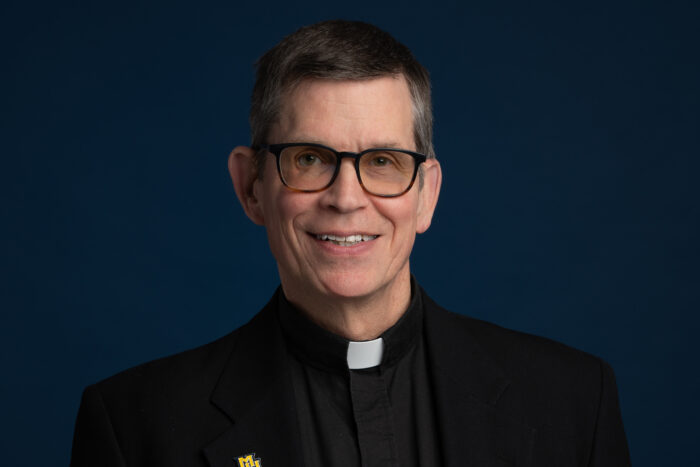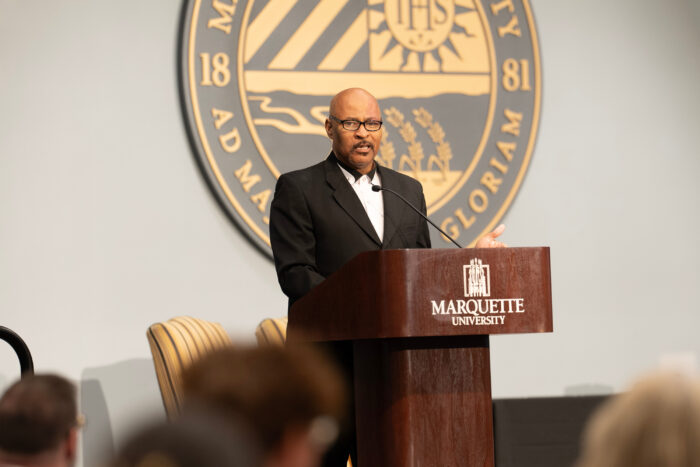University will add 40 full-tuition scholarships, create mandatory training for students, faculty and staff
Dear Marquette community,
Marquette University is taking strides toward better addressing racial justice on our campus, with important events taking place last Thursday and again today. We want to update you about these meetings and resulting action steps we are taking.
Last Thursday, many of our students took part in a demonstration against racial injustice in our country and on our campus. We — along with other senior university leaders — met with the Black Student Council and other concerned students following the student demonstration. Their stories made vividly clear that racism — both systemic racism and racist, discriminatory actions — are part of our campus life. Sadly, the stories they shared are not new, especially for our Black students. They were highlighted in our climate study in 2015 and have been spoken about by our students, alumni, staff and faculty for many years.
As a Catholic, Jesuit university, Marquette is committed to respecting, defending, and preserving the dignity of all people. That means we strive to provide a safe and welcoming environment where all can thrive. But the truth revealed in the experiences of our Black students is that, in far too many cases, we have failed. Our history makes that clear. We need to change.
Racism and discrimination cannot be tolerated on our campus. Whether in the form of individual actions or of racially biased structures, we must recognize what is at stake and work together to overcome such injustice. To those of our community, past or present, whom we have failed by not addressing the racial injustice in our Marquette community, on behalf of Marquette University, we apologize and ask your forgiveness.
To that end, we met again today with Black student leaders, and together, we agreed to collaborate on the following specific steps to increase the diversity of our student body, to improve the experiences of Black students, to foster an inclusive and welcoming environment for all students, to further involve the Black Student Council in decision-making at Marquette, and to assist Black students in achieving academic success at Marquette.
The agreed upon collaborative action steps are summarized as:
- Scholarships/Recruitment: Beginning in fall 2021, Marquette agrees to offer 40 full-tuition, four-year scholarships (five years, if needed) annually to qualified graduating seniors from high schools located in the City of Milwaukee. Marquette has already commenced a fundraising campaign for room and board scholarships for these students. The university will continue to release annual data on the number of Black students at Marquette and will develop a strategy around pipeline programs.
- Diversity of counselors in Counseling Center: The university has already hired a counselor and coordinator for African American and Black student support at the Counseling Center and will hire additional counselors of color in the future.
- Climate: The university will review and revise, as needed, current policies regarding hate speech and racist behaviors to better allow for effective enforcement, with the goal to improve the campus environment for all students and employees. Marquette will work toward creating a Black Living Learning Community in a residence hall.
- Curriculum: Marquette will strengthen the Core Curriculum’s explicit engagement of issues relating to racial injustice. The university will also provide for Black Student Council representation on the University Board of Undergraduate Studies and the Committee on Teaching.
- Training: Marquette, in consultation with the Black Student Council, and others as appropriate, will develop a training program dedicated to raising awareness of bias, harassment and discrimination faced by Black students and other diverse student populations. The program shall be mandatory for all resident assistants, residence hall directors, permanent faculty, staff and students. Class registration will be contingent upon completion of the mandatory training.
- Cultural center on campus: Marquette will engage in a fundraising campaign to create a permanent cultural center on campus for Black students, which will provide mentoring and tutoring. In the meantime, Marquette will provide dedicated space for Black students in Humphrey Hall, rooms 182 and 184.
- Regular meetings between the Black Student Council and the Marquette University Police Department: Marquette will arrange for regular meetings between the Black Student Council and MUPD to address and discuss concerns.
- Committee for Black Student Initiatives: The university will create a standing committee to be called the Committee for Black Student Initiatives, to address, discuss and implement initiatives and programs designed to increase the recruitment, retention and success of Black students at Marquette, and to improve the climate for Black students at Marquette.
- Black student liaison staff position: Marquette will hire a Black Student Liaison, responsible for tracking progress of initiatives and programs aimed at increasing recruitment and retention of Black students and improving the campus climate.
- Recruit additional Black faculty, resident assistants and Black-owned businesses to campus: The university will continue to support the REIS (Race, Ethnic and Indigenous Studies) faculty hiring initiative, and will continue aggressive recruitment of Black Resident Assistants for its residence halls. Marquette will explore bringing Black-owned businesses to campus and expanding the number of Black-owned businesses that supply goods and services to Marquette.
- Provide additional financial support to Black students: Marquette will conduct fundraising campaigns for Black student housing and emergency funds (books, food and other education-related expenses).
These initiatives will be done in collaboration with the previously announced President’s Commission on Racial Equity, which is co-chaired by Dr. Howard Fuller, recently retired distinguished professor of education and founder/director of the Institute for the Transformation of Learning, and Kristine (Kris) Rappé, trustee emerita and retired senior vice president and chief administrative officer at Wisconsin Energy Corporation.
As the president and provost of Marquette, we pledge to work, with your help, toward making Marquette the inclusive, welcoming campus we aspire to be. Let us take up this work together and “Be The Difference.”
Sincerely,
Dr. Michael R. Lovell
President
Dr. Kimo Ah Yun
Provost and Executive Vice President for Academic Affairs


